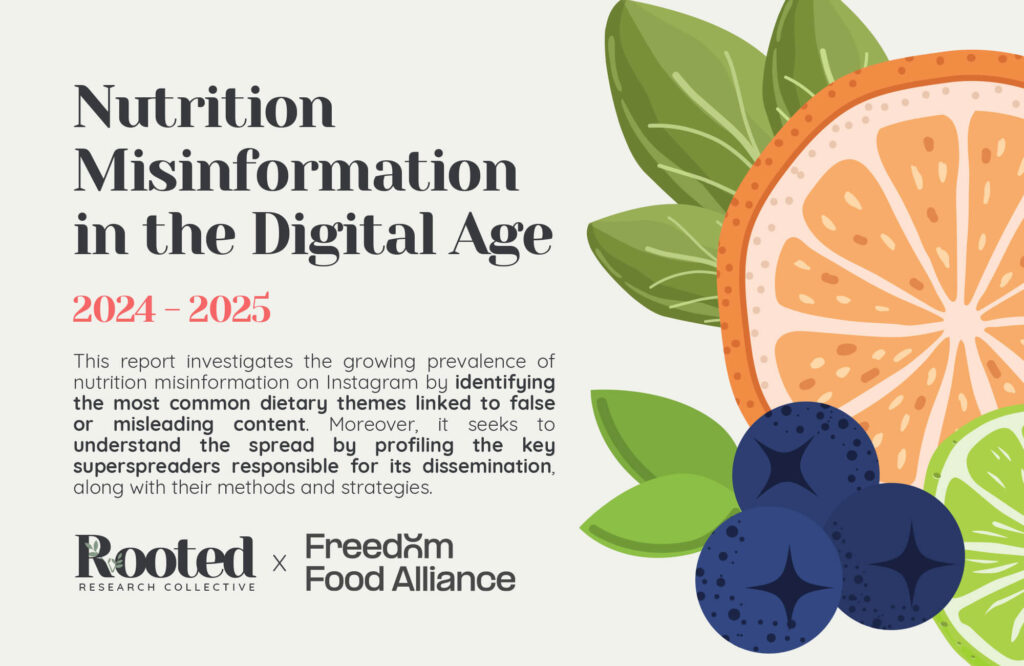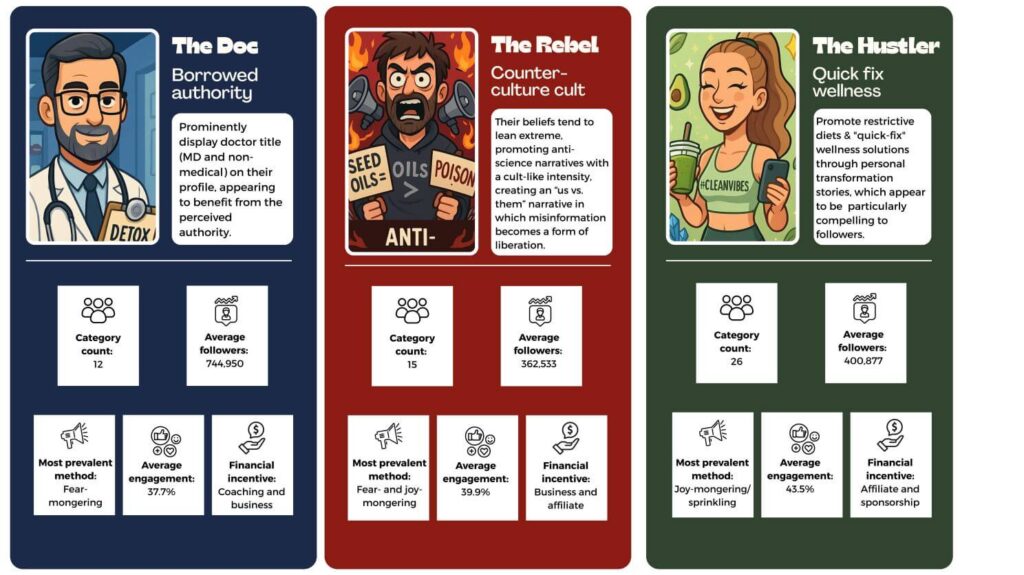Influencers pushing carnivore diets, raw milk, and anti-plant-based narratives are putting millions at risk for profit, new research warns.
A new report by the Rooted Research Collective and the Freedom Food Alliance has sounded the alarm over a wave of online influencers promoting extreme and potentially dangerous dietary practices — from carnivore diets and raw, unpasteurised milk to anti-seed oil campaigns — all while profiting from their online reach.
This report investigates the growing prevalence of nutrition misinformation on Instagram by identifying the most common dietary themes linked to false or misleading content. Moreover, it seeks to understand the spread by profiling the key superspreaders responsible for its dissemination, along with their methods and strategies.

Courtesy: Rooted Research Collective/Freedom Food Alliance
Poor nutrition is now the leading preventable risk factor behind the global rise in non-communicable diseases (NCDs). And yet, research shows that the vast majority of Americans do not meet national dietary guidelines, with a similar picture emerging in the UK, where 64% of adults were classified as overweight or obese in 2022. While much research has focused on the volume and engagement of nutrition misinformation online, few studies have examined the people behind it — their motivations, methods, and narratives — knowledge crucial to developing effective responses that reduce harm and rebuild public trust.
According to findings released by the Rooted Research Collective and the Freedom Food Alliance, a growing number of so-called “super-spreaders” are flooding social media platforms like TikTok and Instagram with misleading and scientifically unsound nutrition advice, targeting tens of millions of followers, particularly among Gen Z and millennials.
The research identified 53 super-spreaders of nutrition misinformation whose accounts collectively reach over 24 million followers. These individuals fall broadly into three categories:
- The Docs – who use real or fabricated medical titles to project authority;
- The Rebels – who push anti-establishment and conspiratorial views with cult-like conviction;
- The Hustlers – who wrap false health claims in persuasive marketing to sell products or programmes.
Despite only a handful having formal nutrition or medical qualifications, many position themselves as doctors — a blurring of credibility that is particularly concerning given its alignment with high-performing misinformation content.

The 3 Most Common Super-Spreader Types – Courtesy: Rooted Research Collective/Freedom Food Alliance
Nutrition trends fuelled by misinformation
The most prevalent misinformation themes promoted by these accounts included carnivore and meat-based diets, general wellness misinformation, and low-carb or ketogenic eating. Over 90% of these super-spreaders promoted multiple overlapping narratives, such as seed oil conspiracies and anti-plant-based rhetoric, creating a concoction of misleading claims. Moreover, 96% of them exhibited clear financial incentives tied to their messaging.
Raw milk — which is illegal for retail sale in Scotland and tightly controlled in the rest of the UK — is also seeing a resurgence in influencer content, appearing in 15% of the profiles studied.
Nutrition misinformation does not operate in isolation, the researchers noted. Over 90% of the accounts examined spread multiple misinformation themes, creating a tangled web of pseudo-scientific claims that overlap and reinforce each other.
Three core dissemination strategies
The report also identifies three key strategies used by these influencers to spread misinformation:
- Fear-mongering: Stoking alarmism and distrust in institutions, particularly around plant-based eating and seed oils, while promoting animal-based diets as a ‘truth-telling’ alternative. Notably, the most liked post in the dataset — with over 3.7 million likes — was an anti-plant-based, pro-carnivore post from a fear-monger account.
- Joy-mongering: Offering hopeful, emotionally charged messages tied to personal transformation, such as ‘before and after’ stories, recipes, and wellness advice framed around restrictive diets.
- Sprinkling: Embedding misinformation within broader lifestyle content, making it harder to detect and easier to digest.
These strategies share a common emotional appeal — whether rooted in fear, hope or inspiration.
Emotional resonance and storytelling
Super-spreaders build trust by connecting emotionally rather than overwhelming audiences with data. They position themselves as relatable truth-tellers challenging corrupt institutions and offering simple, ‘empowering’ solutions. Through personal anecdotes and motivational language, they create an ‘us vs. them’ narrative in which misinformation becomes a form of liberation.
Many frame their dietary advice as part of a broader movement towards healing, strength, clarity, masculinity/femininity or revolution. They champion ‘natural’ or ‘traditional’ diets — often heavily reliant on animal-based foods or rejecting modern solutions to complex health problems. This combination of emotional resonance and charismatic storytelling helps explain why such misinformation is so persuasive.
Profit over public health
Financial motives are a common thread: 96% of the influencers analysed had a clear financial interest in the misinformation they shared. Nearly half own businesses selling supplements or offering controversial health therapies, while others promote affiliate links and discount codes for products that fit their dietary ideology.
Some influencers charge hundreds of pounds for one-on-one consultations, with several running high-ticket “biohacking” programmes. The most followed individuals reportedly earn over £78,000 per month through their social media content alone.
Calls for reform
The researchers are urging swift action to address the public health threat posed by nutrition misinformation online. Recommendations include:
- Integrating nutrition and digital literacy into school curricula to help young people spot misleading content;
- Investing in credible, qualified health professionals to engage on social media, countering dangerous content with evidence-based advice;
- Stronger regulation and ethical oversight, including a crackdown on misuse of medical titles and improved training for healthcare professionals to navigate online misinformation.
The report also highlights a disturbing overlap between nutrition misinformation and politically motivated rhetoric, including gender-based stereotypes. It echoes recent UK research pointing to how some young men are consuming not only meat-heavy diets but also ideologies aligned with misogyny and regressive views.
Navigating the nutrition misinformation crisis
We recognise that the digital age has transformed how nutrition information is shared and consumed — for better and worse. While social media has the power to connect and educate, the rise of nutrition misinformation presents a clear and urgent public health challenge.
We view the surge in nutrition misinformation as an urgent call to action. Simply sharing facts is no longer enough — effective nutrition communication demands empathy, trust-building, and accessibility. Empowering consumers with digital literacy skills is essential so they can critically evaluate the information they encounter online. Equally important is supporting health professionals to engage confidently and authentically on social media, providing credible and relatable guidance.
Our takeaway is clear: by fostering open, inclusive dialogue and forging strong partnerships across sectors, we can disrupt the cycle of misinformation. Together, we can create a healthier information ecosystem that helps people make informed, positive choices for their wellbeing.
Read more:
https://rootedresearch.co/publications/nutrition-misinformation-digital-age/

